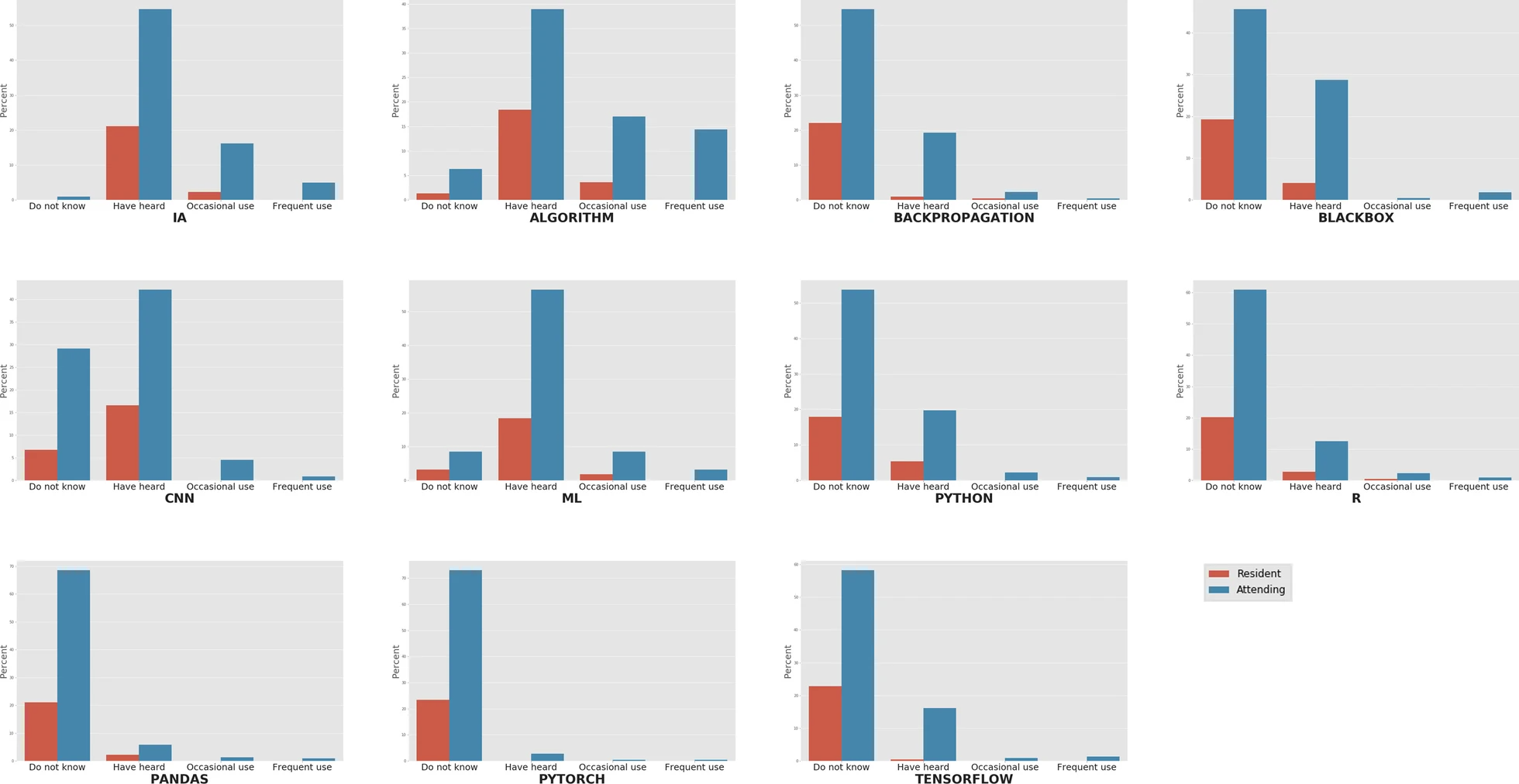Difference between revisions of "Template:Article of the week"
Shawndouglas (talk | contribs) (Updated article of the week text) |
Shawndouglas (talk | contribs) (Updated article of the week text) |
||
| Line 1: | Line 1: | ||
<div style="float: left; margin: 0.5em 0.9em 0.4em 0em;">[[File:Fig1 Eiroa InsightsIntoImaging22 13.png|240px]]</div> | |||
'''"[[Journal: | '''"[[Journal:The current state of knowledge on imaging informatics: A survey among Spanish radiologists|The current state of knowledge on imaging informatics: A survey among Spanish radiologists]]"''' | ||
There is growing concern about the impact of [[artificial intelligence]] (AI) on radiology and the future of the profession. The aim of this study is to evaluate general knowledge and concerns about trends on [[imaging informatics]] among radiologists working in Spain (residents and attending physicians). For this purpose, an online survey among radiologists working in Spain was conducted with questions related to knowledge about terminology and technologies, need for a regulated academic training on AI, and concerns about the implications of the use of these technologies. A total of 223 radiologists answered the survey, of whom 23.3% were residents and 76.7% were attending physicians. General terms such as "AI" and "algorithm" had been heard of or read in at least 75.8% and 57.4% of the cases, respectively, while more specific terms were scarcely known. All the respondents considered that they should pursue academic training in [[medical informatics]] and new technologies, and 92.9% of them reckoned this preparation should be incorporated in the training program of the specialty ... ('''[[Journal:The current state of knowledge on imaging informatics: A survey among Spanish radiologists|Full article...]]''')<br /> | |||
<br /> | <br /> | ||
''Recently featured'': | ''Recently featured'': | ||
{{flowlist | | {{flowlist | | ||
* [[Journal:Emerging cybersecurity threats in radiation oncology|Emerging cybersecurity threats in radiation oncology]] | |||
* [[Journal:An automated dashboard to improve laboratory COVID-19 diagnostics management|An automated dashboard to improve laboratory COVID-19 diagnostics management]] | * [[Journal:An automated dashboard to improve laboratory COVID-19 diagnostics management|An automated dashboard to improve laboratory COVID-19 diagnostics management]] | ||
* [[Journal:Management of post-analytical processes in the clinical laboratory according to ISO 15189:2012: Considerations about the management of clinical samples, ensuring quality of post-analytical processes and laboratory information management|Management of post-analytical processes in the clinical laboratory according to ISO 15189:2012: Considerations about the management of clinical samples, ensuring quality of post-analytical processes and laboratory information management]] | * [[Journal:Management of post-analytical processes in the clinical laboratory according to ISO 15189:2012: Considerations about the management of clinical samples, ensuring quality of post-analytical processes and laboratory information management|Management of post-analytical processes in the clinical laboratory according to ISO 15189:2012: Considerations about the management of clinical samples, ensuring quality of post-analytical processes and laboratory information management]] | ||
}} | }} | ||
Revision as of 18:01, 3 October 2022
"The current state of knowledge on imaging informatics: A survey among Spanish radiologists"
There is growing concern about the impact of artificial intelligence (AI) on radiology and the future of the profession. The aim of this study is to evaluate general knowledge and concerns about trends on imaging informatics among radiologists working in Spain (residents and attending physicians). For this purpose, an online survey among radiologists working in Spain was conducted with questions related to knowledge about terminology and technologies, need for a regulated academic training on AI, and concerns about the implications of the use of these technologies. A total of 223 radiologists answered the survey, of whom 23.3% were residents and 76.7% were attending physicians. General terms such as "AI" and "algorithm" had been heard of or read in at least 75.8% and 57.4% of the cases, respectively, while more specific terms were scarcely known. All the respondents considered that they should pursue academic training in medical informatics and new technologies, and 92.9% of them reckoned this preparation should be incorporated in the training program of the specialty ... (Full article...)
Recently featured:
- Emerging cybersecurity threats in radiation oncology
- An automated dashboard to improve laboratory COVID-19 diagnostics management
- Management of post-analytical processes in the clinical laboratory according to ISO 15189:2012: Considerations about the management of clinical samples, ensuring quality of post-analytical processes and laboratory information management










